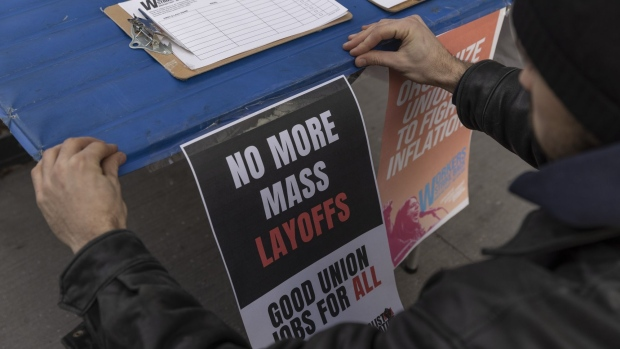Apple Joins Fellow Tech Giants by Falling Victim to the Layoff Epidemic
Alphabet Workers Union rally in New York regarding the 12,000 layoffs done by Google. Photo: Bloomberg
Mass layoffs have become a pressing problem threatening job security and stability in the tech industry. In response to the post-pandemic hiring binge and fear of a slowing economy, tech giants have decided to cut back on resources, leading to the loss of thousands of jobs. Such decisions have inevitably sparked outrage and demonstrations concerning workers’ rights and the ethics of mass layoffs. In the case of Apple, they were known to cultivate a strong reputation for circumventing severe job cuts, which unfortunately did not last.
As one of the most profitable tech companies, Apple aims to protect its reputation of stability. The company has made many key business decisions surrounding avoiding layoffs. They have reduced the frequency of bonuses for the workforce and pushed back on extra projects to minimize spending and hold on to cash for longer. CEO Tim Cook continues to emphasize Apple’s consciousness with spending in his statement to shareholders, “We're being very prudent and thoughtful on spending and we continue to be very deliberate when it comes to hiring.”
The company has also kept a slow pace in hiring by recruiting a few employees while still generating more revenue per new hire than its competitors. To slow down their pace, Apple carefully selects specific departments of their company to freeze, especially external research and development.
However, despite having stood out from the crowd for many months, Apple could not escape the layoff epidemic entirely. Over the holiday quarter, Apple faced a 5 percent revenue decline and predicted a further decrease over the next quarters. With this, they reluctantly proceeded to eliminate roles in its corporate retail teams — teams primarily responsible for the upkeep and construction of Apple’s retail stores worldwide. This was done to improve their management of stores globally.
While the number of layoffs has not been disclosed, it is assumed to have affected far fewer workers than the other tech giants Google, Amazon, Meta, and Microsoft. According to a report, “Amazon has laid off 27,000, Meta has laid off 21,000, Microsoft has laid off 10,000, and Google has laid off 10,000 workers in recent months.” Apple, however, is offering up to four months of severance pay to those unable to find and apply for permanent positions in other parts of the company.
Google workers at a demonstration against layoffs outside the Kings Cross headquarters in London, Britain on Tuesday. Photo: REUTERS/Henry Nicholls
Why does the need for corporate layoffs particularly most impact the tech industry? The rising inflation rates have progressively altered consumer spending patterns that work unfavorably for tech. Seeing that sophisticated technology is a luxury, inflation has prompted consumers to buy more necessities besides upgrading their personal technology. Hence, the need for budget cuts has significantly threatened the workforce of tech firms industry-wide.
Indeed, the way companies retain or lay off employees reflects their management, structure, and quality of HR practices. With the fluctuating nature of the economy, the right approach to managing the labor force continues to pose a significant challenge for many tech firms.


